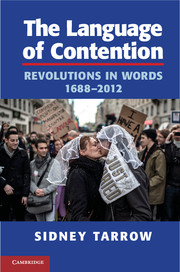Book contents
3 - Words at Work
Published online by Cambridge University Press: 05 June 2014
Summary
This chapter analyzes the language of contention that emerged from labor conflict. It begins with two of these words: sabotage and striking. It then turns to the broader issue of the formation of the working class in England, made famous by E. P. Thompson and a number of historians and sociologists. The third part moves from England to France and the United States, where similar histories of class formation can be found. The fourth part reflects on the decline of class language in contemporary politics. The underlying theme of the chapter is the strong influence of the political context both on the construction of class conflict and on the constitution of the working class. I begin with a form of contention that, like many others, emerged from a specific conflict between workers and their employer in the context of a political crisis – the boycott – and then became modular.
Boycotting Colonel Boycott
boycott (tr): to refuse to have dealings with (a person, organization, etc.) or refuse to buy (a product) as a protest or means of coercion to boycott foreign produce.
Colonel Charles Boycott was the land agent for Lord Erne during the Irish land wars of the 1870s and 1880s. Charles Parnell, an Irish politician, had called for reform of the extortionate rents that Irish farm workers were forced to pay their absentee English landlords. When Boycott refused, he was chosen as the target of the new policy, designed to put pressure on greedy landlords by ostracizing their agents and avoiding the violence that had often broken out during the land wars. When Boycott’s workers refused to work in the fields as well as in his house, and when even the local merchants refused to trade with him, he was completely isolated (Marlow 1973).
- Type
- Chapter
- Information
- The Language of ContentionRevolutions in Words, 1688–2012, pp. 54 - 80Publisher: Cambridge University PressPrint publication year: 2013



